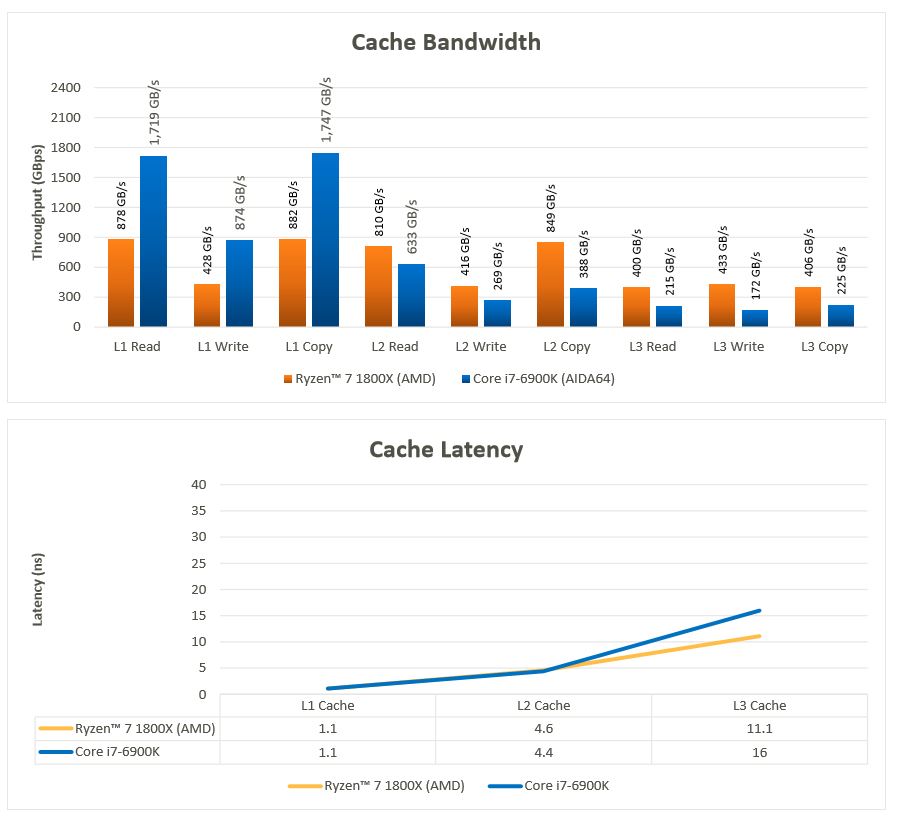AMD Ryzen 7 1800X CPU Review
Why you can trust Tom's Hardware
Cache Testing
The Cache Testing Dilemma
The Ryzen reviewer's guide contained an interesting note regarding L1, L2, and L3 cache measurement tools. AMD indicates that AIDA64 and SiSoftware Sandra, both commonly-used tools for cache testing, are "not yet equipped to accurately measure cache performance of the Zen architecture." AMD provided its own internally-measured reference values and noted that it is working with the FinalWire (AIDA) and SiSoftware teams to facilitate accurate Zen cache measurement methodology in the future.
We measured performance with the utilities and achieved similar results for Intel's Core i7-6900K, but we also noticed a large gap between the AMD-provided Ryzen measurements and our test results. Ryzen’s L3 cache latency measured 20 ~ 23ns, which is double the provided value. Due to some of the performance characteristics we noted during our game testing, we also tested with SMT enabled and disabled, but the results fell within expected variation. We also measured a ~10ns memory latency gap in favor of the Intel processor.
Many common utilities write zeros to the cache to measure performance. AMD responded to our inquiries and stated that Intel coalesces incoming "zero" write traffic before it passes it to the cache, which could yield artificially high cache throughput measurements, particularly because those patterns don't exist in real-world usage. In our opinion, changing the access pattern would result in reduced performance measurements for the Intel processors, but it certainly shouldn't boost AMD's cache measurements. AMD responded that the current utilities are also not optimized for Zen's unique architecture, and optimizing the utilities' code paths will expose more performance.
We contacted both SiSoftware and FinalWire to request any updated or beta versions of their utilities that can facilitate accurate testing. There is still collaboration between the company's and AMD to resolve the issue, but unfortunately, we aren't at liberty to discuss the details of those conversations. Until that time, and until the vendors and AMD agree on what's happening, we've determined that drawing any conclusions from these results would be irresponsible, and ultimately misleading. When we have final, verified, and real numbers, we'll provide them.
Get Tom's Hardware's best news and in-depth reviews, straight to your inbox.
Current page: Cache Testing
Prev Page Overclocking & Test Setup Next Page Ashes of the Singularity & Battlefield 4
Paul Alcorn is the Editor-in-Chief for Tom's Hardware US. He also writes news and reviews on CPUs, storage, and enterprise hardware.
-
vrumor Well, at the very least, it is competition. Competition drives innovation and lower costs. Well done AMD.Reply -
kiniku Why did I feel AMD was hiding something? Understandably the "gamer market" is comparatively small. But couldn't AMD have designed a CPU that worked well in gaming/desktops and in data centers? Disappointing.Reply
(But I have a 5820K. The best Ryzen in the world would not have had me switch anyway.) -
xryanx123 Bias review as always. Most of your information is obviously screwed up. How do you get 4.0ghz at 1.45v. When that's not even an overclock for the chip (not really at least compared to stock) yet you're already pushing 1.45v? You're tailoring your articles for the uneducated. Duck off tomsReply -
captaincharisma in the end the best anyone can hope from AMD is that it spooked intel enough to lower its pricesReply -
ssdpro In a hurry to compare various site's gaming results, it appears differing sites are finding the same thing: gaming performance is acceptable but below 4c/8t Intel offerings. If you spend your day encoding or multi-thread benching this is a monster bargain.Reply
With the good and bad, I think we can all agree the good here is competition. There is some now. -
Pompompaihn All along AMD was claiming to equal/beat Broadwell-E in comparative tasks at half the price, and from another review that included Broadwell-E, it's done that. I don't recall ANY AMD press saying it was going to beat the 7700K in straight up gaming. So, target set, and hit. That's a win in my book. But now, need to see what they can do with the smaller core count chips and if they can scale frequency to be competitive in the gaming sector.Reply -
Dionisiatis Maybe i missed it but i would love to see a perf/dollar ratio comparison. Im sure Ryzen would occupy the top position, and it would also make it clear that AMD achieved extraordinary results in bringing such high performance to the average consumer that cant 700+ dollars for a CPU.Reply -
jackspeed @Dionisiatis the 7700K is cheaper then the 1800X so for gamers it currently is the best CPU. now games have yet to optimize for the new AMD architecture, so maybe soon it will be a different story.Reply -
Aspiring techie Your "Heating up AMD Ryzen" video on the Power and Temperatures tab is still private. I can't watch it.Reply -
Fails in gaming, and for multitasking stuff i got Xeon 14/28 who is doing all that encoding and other stuff for $300 on eBay.Reply
In my opinion AMD failed and they really pulled BS by fooling people into pre ordering but it turns out that in gaming sucks..
